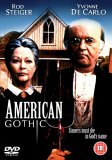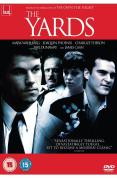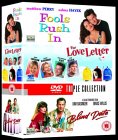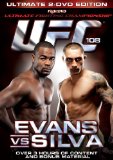![Scott Pilgrim vs The World [4K Ultra HD] [2010] [Blu-ray] [Region Free]](/pictures/1155506.jpg) Scott Pilgrim vs The World | Blu Ray | (05/07/2021)
from £21.98
| Saving you £N/A (N/A%)
| RRP
Scott Pilgrim vs The World | Blu Ray | (05/07/2021)
from £21.98
| Saving you £N/A (N/A%)
| RRP Game on! Scott Pilgrim just met the girl of his dreams literally. But in order for them to date, he must defeat her seven evil exes a rogues' gallery, including an infamous skateboarder, a vegan rock star and fearsome identical twins! From the genre-smashing director of Hot Fuzz and Shaun of the Dead comes a true original (Entertainment Weekly ) powered up by wit, action and groundbreaking visuals that you will want to watch again as soon as it's over! Special Features 4 Feature Commentaries Deleted Scenes Scott Pilgrim vs. the Outtakes The Making of Scott Pilgrim vs. the World You Too Can Be Sex Bob-Omb Music Featurette & Music Videos Alternative Footage Adult Swimâ¢: Scott Pilgrim vs. the Animation Pre-production Footage And Much More!
![The Old Grey Whistle Test -- Two Disc Set [1971]](/pictures/1027399.jpg) The Old Grey Whistle Test -- Two Disc Set | DVD | (17/09/2001)
from £9.35
| Saving you £15.64 (167.27%)
| RRP
The Old Grey Whistle Test -- Two Disc Set | DVD | (17/09/2001)
from £9.35
| Saving you £15.64 (167.27%)
| RRP For better and for worse, The Old Grey Whistle Test was probably the most resolutely serious music programme ever broadcast on television. During its 16-year run it showcased only the most earnest exponents of whichever musical style was currently popular, and given that the programme's heyday coincided with the early 70s, some of the footage included here will provide mirth as exquisite as only unintentional comedy can. The absurd prog noodlings of The Edgar Winter Group and the belief-beggaringly awful Focus now seem as unfathomable in retrospect as trench warfare or child labour. However, the good stuff collected here is very good, both in terms of performance (Tom Petty snarling "American Girl", a pre-irony U2 whooping up "I Will Follow") and historical interest, notably a shockingly youthful Elton John crooning "Tiny Dancer" and reminding us, in the process, of a time when he was regarded as a cool and hip singer-songwriter, rather than understudy to the Queen Mother. --Andrew Mueller On the DVD: Wonderful performances all captured in remarkably pristine picture and extraordinarily vivid sound, regardless of vintage (it doesn't even crackle during "Hocus Pocus"!). However, the menu is pretty clunky and won't allow direct access to the individual songs (other than selecting the "Random play" option). Instead, you can only jump into the programme year by year, not song by song. The track listing itself is unhelpfully hidden behind the discs in the gatefold packaging. --Mark Walker
 American Gothic | DVD | (06/03/2006)
from £6.99
| Saving you £3.00 (42.92%)
| RRP
American Gothic | DVD | (06/03/2006)
from £6.99
| Saving you £3.00 (42.92%)
| RRP A group of yuppies charter a plane for a camping getaway only to find themselves making an emergency landing on an isolated island. They are taken in for the night by the only inhabitants the rabidly-religious ""Ma & Pa"" who seem trapped in a Rockwellian time-warp. This proves to be every bit as unpleasant as it seems.
 The Yards | DVD | (17/03/2008)
from £9.98
| Saving you £8.00 (100.13%)
| RRP
The Yards | DVD | (17/03/2008)
from £9.98
| Saving you £8.00 (100.13%)
| RRP A young man just out of prison wants to go straight but is drawn back into a life of crime
![Star Trek 4 : The Voyage Home [1987]](/pictures/1029340.jpg) Star Trek 4 : The Voyage Home | DVD | (06/08/2001)
from £10.03
| Saving you £9.96 (99.30%)
| RRP
Star Trek 4 : The Voyage Home | DVD | (06/08/2001)
from £10.03
| Saving you £9.96 (99.30%)
| RRP The most popular movie in the "classic Trek" series of feature films, Star Trek IV was a box-office smash that satisfied mainstream audiences and hardcore fans alike. The Voyage Home returns to one of the favourite themes of the original TV series--time travel--to bring Kirk, Spock, McCoy, Scotty, Sulu, Uhura, and Chekov from the 23rd century to present-day (ie, mid-1980s) San Francisco. In their own time, the Starfleet heroes encounter an alien probe emitting a mysterious message--a message delivered in the song of the now-extinct Earth species of humpback whales. Failure to respond to the probe will result in Earth's destruction, so Kirk and company time-travel to 20th-century Earth--in their captured Klingon starship--to transport a humpback whale to the future in an effort to communicate peacefully with the alien probe. The plot sounds somewhat absurd in description, but as executed by returning director Leonard Nimoy, this turned out to be a crowd-pleasing adventure, filled with a great deal of humour derived from the clash of future heroes and contemporary urban realities, and much lively interaction among the favourite Trek characters. Catherine Hicks plays the 20th-century whale expert who is finally convinced of Kirk's and Spock's benevolent intentions. --Jeff Shannon, Amazon.com
 Fools Rush In / The Love Letter / Blind Date | DVD | (06/09/2004)
from £N/A
| Saving you £N/A (N/A%)
| RRP
Fools Rush In / The Love Letter / Blind Date | DVD | (06/09/2004)
from £N/A
| Saving you £N/A (N/A%)
| RRP Blind Date: It's embarrassment laughs and disaster when workaholic Walter Davis is set up on a blind date for an important business function. Surprisingly the evening starts off well. His date Nadia is gorgeous and very popular but all hell breaks loose when she has one drink too many and reduces the evening (and Walter's career) to a shambles. Bad turns to worse when Nadia's psychotically jealous ex-boyfriend catches them together and Walter finds himself dragged on a hilarious adventure that could cost him his money his sanity and even his life! The Love Letter: In a sleepy New England town a letter has arrived that is sure to wake things up. It's a love letter - ardent sensual... and unsigned. As the letter falls into different hands residents of the small town start to eye one another with renewed interest - wondering who it's for and who it's from. Determined to find the letter's author Helen MacFarquhar (Kate Capshaw) begins a quest that will open her life to a new chapter involving two decidedly different men: George (Tom Selleck) an old friend from her past and Johnny (Tom Everett Scott) a young man very much in her present. Unexpectedly one mysterious love note has the power to unlock some startling secrets leaving a trail of wonderful surprises as it turns the entire town upside down. Fools Rush In: Sparks fly and cultures collide in this romantic comedy about a casual night of passion that turns into the love of a lifetime! Matthew Perry stars as Alex Whitman a New Yorker sent to Las Vegas to oversee a construction project. There he meets Isabel Fuentes (Salma Hayek) and some serious chemistry brings them together for one night. But Alex doesn't see Isabel again until three months later when he learns that she is pregnant. On a whim and a prayer he proposes. However there's more to marriage than a Vegas chapel and an Elvis impersonator as Alex and Isabel soon learn...
![The Yards [2000]](/pictures/1022553.jpg) The Yards | DVD | (18/06/2001)
from £4.88
| Saving you £-0.89 (N/A%)
| RRP
The Yards | DVD | (18/06/2001)
from £4.88
| Saving you £-0.89 (N/A%)
| RRP A young man just out of prison wants to go straight but is drawn back into a life of crime
![South West 9 [2001]](/pictures/1019952.jpg) South West 9 | DVD | (14/04/2003)
from £4.78
| Saving you £9.21 (192.68%)
| RRP
South West 9 | DVD | (14/04/2003)
from £4.78
| Saving you £9.21 (192.68%)
| RRP Set in Brixton, SW9, land of yuppies, clubbers, anarchists, guns and riots, this new Britsh drama follows five very different characters through a single extraordinary day.
 Star Trek 4: The Voyage Home (Special Edition) | DVD | (02/06/2003)
from £9.98
| Saving you £15.01 (150.40%)
| RRP
Star Trek 4: The Voyage Home (Special Edition) | DVD | (02/06/2003)
from £9.98
| Saving you £15.01 (150.40%)
| RRP The most popular movie in the "classic Trek" series of feature films, Star Trek IV was a box-office smash that satisfied mainstream audiences and hard-core fans alike. The Voyage Home returns to one of the favourite themes of the original TV series--time travel--to bring Kirk, Spock, McCoy, Scotty, Sulu, Uhura and Chekov from the 23rd century to present-day (i.e., mid-1980s) San Francisco. In their own time, the Starfleet heroes encounter an alien probe emitting a mysterious message--a message delivered in the song of the now-extinct Earth species of humpback whales. Failure to respond to the probe will result in Earth's destruction, so Kirk and company time-travel to 20th-century Earth--in their captured Klingon starship--to transport a humpback whale to the future in an effort to communicate peacefully with the alien probe. The plot sounds somewhat absurd in description, but as executed by returning director Leonard Nimoy, this turned out to be a crowd-pleasing adventure, filled with a great deal of humour derived from the clash of future heroes and contemporary urban realities, and much lively interaction among the favourite Trek characters. Catherine Hicks plays the 20th-century whale expert who is finally convinced of Kirk's and Spock's benevolent intentions. --Jeff Shannon
![Star Trek 3 - The Search For Spock [1984]](/pictures/1029329.jpg) Star Trek 3 - The Search For Spock | DVD | (01/10/2001)
from £N/A
| Saving you £N/A (N/A%)
| RRP
Star Trek 3 - The Search For Spock | DVD | (01/10/2001)
from £N/A
| Saving you £N/A (N/A%)
| RRP The name says it all--Star Trek III: The Search for Spock--so you didn't think Mr. Spock was really dead, did you? When Spock's casket landed on the surface of the Genesis planet at the end of Star Trek II, we had already been told that Genesis had the power to bring "life from lifelessness". So it's no surprise that this energetic but somewhat hokey sequel gives Spock a new lease of life, beginning with his rebirth and rapid growth as the Genesis planet literally shakes itself apart in a series of tumultuous geological spasms. As Kirk is getting to know his estranged son (Merritt Butrick), he must also do battle with the fiendish Klingon Kruge (Christopher Lloyd), who is determined to seize the power of Genesis from the Federation. Meanwhile, the regenerated Spock returns to his home planet, and Star Trek III gains considerable interest by exploring the ceremonial (and, of course, highly logical) traditions of Vulcan society. The movie's a minor disappointment compared to Star Trek II, but it's a--well, logical--sequel that successfully restores Spock (and first-time film director Leonard Nimoy) to the phenomenal Trek franchise ... as if he were ever really gone. With Kirk's wilful destruction of the USS Enterprise and Robin Curtis replacing the departing Kirstie Alley as Vulcan Lt Saavik, this was clearly a transitional film in the series, clearing the way for the highly popular Star Trek IV. --Jeff Shannon, Amazon.com
 The Old Grey Whistle Test 2 | DVD | (13/10/2003)
from £12.76
| Saving you £7.23 (56.66%)
| RRP
The Old Grey Whistle Test 2 | DVD | (13/10/2003)
from £12.76
| Saving you £7.23 (56.66%)
| RRP In some ways The Old Grey Whistle Test Volume 2 is more interesting than its predecessor, as it covers the show's enjoyably uncomfortable period of transition from beard-rock to punk/new wave. Hence, the music ranges across the likes of Loggins and Messina (the frightful "The House at Pooh Corner"), the Who, Judee Sill, Argent (doing "God Gave Rock 'n' Roll to You", which all Bill and Ted fans probably think is a Kiss original), Roy Harper, the Adverts, the Undertones (not playing "Teenage Kicks", sadly), Patti Smith and Siouxie and the Banshees. There's also some arty stuff that doesn't really fit into either camp, including Kevin Ayers and Roxy Music at their uncommercially weirdest. There are a few nicely revelatory moments, too, such as the realisation that Thomas Dolby's "Hyperactive" was in fact a nu-jazz masterpiece born 20 years too soon and that Robbie Williams should cover Aztec Camera's wonderful "Walk Out to Winter" immediately. This is an enjoyable and diverse collection of music from a fairly fraught period in the history of more-or-less popular music, so it's good to be reminded just how much good stuff was actually happening amidst the melée. On the DVD: The Old Grey Whistle Test 2 comes on only one disc (the first was a two-disc set), but you still get 30 or so excellent tracks plus all the trimmings, so that's hardly a fault. The layout features the same kind of horribly overdesigned menus as its predecessor: there's no obvious chapter sub-menu, believe it or not; instead, you have to access individual tracks through the artists' gallery in the extras section! Aargh! Other extras include contributor profiles, additional linking material and the wonderful Old Grey Squirrel Test animation, which mere words would only spoil for those who have yet to see it. --Roger Thomas
![Star Trek 3: The Search for Spock -- Two Disc Special Edition [1984]](/pictures/1029229.jpg) Star Trek 3: The Search for Spock -- Two Disc Special Edition | DVD | (13/01/2003)
from £N/A
| Saving you £N/A (N/A%)
| RRP
Star Trek 3: The Search for Spock -- Two Disc Special Edition | DVD | (13/01/2003)
from £N/A
| Saving you £N/A (N/A%)
| RRP With hindsight, Star Trek III: The Search for Spock is the satisfactory middle instalment of a well-rounded trilogy that began with The Wrath of Kahn and ended with The Voyage Home (after which this crew really should have retired gracefully). But on its first release, few fans knew what to expect and initial impressions were disappointing. The biggest talking points were that the film was Leonard Nimoy's directorial debut and that his name wasn't in the opening credits. Naturally, the biggest question was just how would the loss of Spock affect the franchise? That question was neatly dodged and what audiences got instead was a tale of team-spiritedness, sacrifice and rebellion that ended on a question mark. In other words it was a fun ride without many answers. The centrepiece of the movie has to be stealing The Enterprise, a beautifully conceived sequence that remains at the heart of classic Trek's filmic storyline: sacrificing all for the sake of friendship, Kirk and co. set out to rescue their lost companion; this single action defines everything the characters had ever meant to each other, and has an effect on everything that followed. And if the loss of Spock had left audiences eager for more, that was as nothing compared to the loss of The Enterprise. On the DVD: Star Trek III on disc does not come in a new transfer as the previous two special edition DVDs, and you won't find any deleted or new scenes either. The extras package is fascinating, nonetheless, especially with the contributions from Nimoy. His fond reminiscences in the commentary track are priceless, with good support from writer-producer Harve Bennett, director of photography Charles Correll, and Robin Curtis (Saavik). The text commentary from the Okudas isn't as involving as the others, sadly, but this is made up for by the trivia dished out in documentaries covering: model-making, costume design, the science of Terraforming, and how to speak Klingon. The best inclusion is "Captain's Log" featuring interviews with an enthusiastic Nimoy, a sarcastic Shatner, an appreciative Curtis and the rarely seen Christopher Lloyd. --Paul Tonks
![Streetwise / Tiny: The Life of Erin Blackwell (The Criterion Collection) [Blu-ray]](/pictures/1162366.jpg) Streetwise / Tiny: The Life of Erin Blackwell (The Criterion Collection) | Blu Ray | (15/06/2021)
from £N/A
| Saving you £N/A (N/A%)
| RRP
Streetwise / Tiny: The Life of Erin Blackwell (The Criterion Collection) | Blu Ray | (15/06/2021)
from £N/A
| Saving you £N/A (N/A%)
| RRP  UFC 108: EVANS VS SILVA (DOUBLE DVD) | DVD | (03/05/2010)
from £N/A
| Saving you £N/A (N/A%)
| RRP
UFC 108: EVANS VS SILVA (DOUBLE DVD) | DVD | (03/05/2010)
from £N/A
| Saving you £N/A (N/A%)
| RRP UFC 108: Evans Vs. Silva (2 Discs)

Please wait. Loading...
This site uses cookies.
More details in our privacy policy